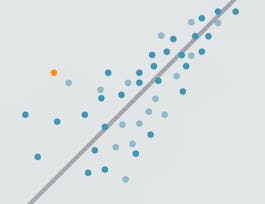This course covers commonly used statistical inference methods for numerical and categorical data. You will learn how to set up and perform hypothesis tests, interpret p-values, and report the results of your analysis in a way that is interpretable for clients or the public. Using numerous data examples, you will learn to report estimates of quantities in a way that expresses the uncertainty of the quantity of interest. You will be guided through installing and using R and RStudio (free statistical software), and will use this software for lab exercises and a final project. The course introduces practical tools for performing data analysis and explores the fundamental concepts necessary to interpret and report results for both categorical and numerical data


Inferential Statistics
This course is part of Data Analysis with R Specialization
Taught in English
Some content may not be translated

Instructor: Mine Çetinkaya-Rundel
115,701 already enrolled
Included with 
Course
(2,628 reviews)
93%
Skills you'll gain
Details to know

Add to your LinkedIn profile
12 quizzes
Course
(2,628 reviews)
93%
See how employees at top companies are mastering in-demand skills

Build your subject-matter expertise
- Learn new concepts from industry experts
- Gain a foundational understanding of a subject or tool
- Develop job-relevant skills with hands-on projects
- Earn a shareable career certificate


Earn a career certificate
Add this credential to your LinkedIn profile, resume, or CV
Share it on social media and in your performance review

There are 5 modules in this course
This short module introduces basics about Coursera specializations and courses in general, this specialization: Statistics with R, and this course: Inferential Statistics. Please take several minutes to browse them through. Thanks for joining us in this course!
What's included
2 readings
Welcome to Inferential Statistics! In this course we will discuss Foundations for Inference. Check out the learning objectives, start watching the videos, and finally work on the quiz and the labs of this week. In addition to videos that introduce new concepts, you will also see a few videos that walk you through application examples related to the week's topics. In the first week we will introduce Central Limit Theorem (CLT) and confidence interval.
What's included
7 videos6 readings3 quizzes
Welcome to Week Two! This week we will discuss formal hypothesis testing and relate testing procedures back to estimation via confidence intervals. These topics will be introduced within the context of working with a population mean, however we will also give you a brief peek at what's to come in the next two weeks by discussing how the methods we're learning can be extended to other estimators. We will also discuss crucial considerations like decision errors and statistical vs. practical significance. The labs for this week will illustrate concepts of sampling distributions and confidence levels.
What's included
7 videos5 readings3 quizzes
Welcome to Week Three of the course! This week we will introduce the t-distribution and comparing means as well as a simulation based method for creating a confidence interval: bootstrapping. If you have questions or discussions, please use this week's forum to ask/discuss with peers.
What's included
11 videos5 readings3 quizzes
Welcome to Week Four of our course! In this unit, we’ll discuss inference for categorical data. We use methods introduced this week to answer questions like “What proportion of the American public approves of the job of the Supreme Court is doing?” Also in this week you will use the data set provided to complete and report on a data analysis question. Please read the project instructions to complete this self-assessment.
What's included
11 videos6 readings3 quizzes
Instructor

Offered by
Recommended if you're interested in Probability and Statistics

Duke University

Duke University

University of Colorado Boulder

Duke University
Why people choose Coursera for their career




Learner reviews
Showing 3 of 2628
2,628 reviews
- 5 stars
83.19%
- 4 stars
13.26%
- 3 stars
1.86%
- 2 stars
0.60%
- 1 star
1.06%
New to Probability and Statistics? Start here.

Open new doors with Coursera Plus
Unlimited access to 7,000+ world-class courses, hands-on projects, and job-ready certificate programs - all included in your subscription
Advance your career with an online degree
Earn a degree from world-class universities - 100% online
Join over 3,400 global companies that choose Coursera for Business
Upskill your employees to excel in the digital economy
Frequently asked questions
If you want to complete the course and earn a Course Certificate by submitting assignments for a grade, you can upgrade your experience by subscribing to the course for $49/month. You can also apply for financial aid if you can't afford the course fee.
When you enroll in a course that is part of a Specialization (which this course is), you will automatically be enrolled in the entire Specialization. You can unenroll from the Specialization if you’re not interested in the other courses or cancel your subscription once you complete the single course.
To enroll in an individual course, search for the course title in the catalog.
To get full access to a course, including the option to earn grades and a Course Certificate, you'll need to subscribe. New subscribers will start with a full access subscription, which includes full access to every course in the Coursera catalog. Existing Specialization subscribers will be given the option to update to a full access subscription when enrolling in a new Specialization or course.
When you enroll in a course that is part of a Specialization, you will automatically be enrolled in the entire Specialization. You can unenroll from the Specialization if you’re not interested in the other courses.
No. Completion of a Coursera course does not earn you academic credit from Duke; therefore, Duke is not able to provide you with a university transcript. However, your electronic Certificate will be added to your Accomplishments page - from there, you can print your Certificate or add it to your LinkedIn profile.

